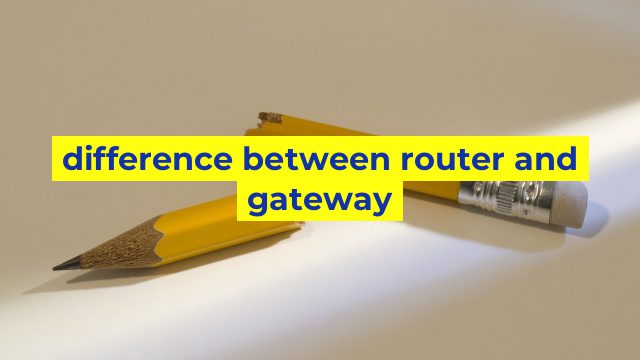The Differences Between Router and Gateway
When it comes to networking terms, people often confuse router and gateway as the same thing. However, both are different in function and purpose. In this blog, we’ll explore the differences between a router and a gateway.
What is a Router?
A router is a device that connects multiple networks together, such as your home network and the internet. Routers act as gateways for data to travel between local networks and the internet. They are responsible for directing traffic and ensuring data is transmitted to the right destination.
Some of the primary functions of a router include:
– Assigning IP addresses to devices on a network
– Managing network traffic
– Filtering and blocking unwanted traffic
– Providing security for the network
– Connecting devices wirelessly
What is a Gateway?
A gateway, on the other hand, is a device that connects one network to another network that uses a different protocol. A gateway is a kind of translator that helps devices from different networks communicate with each other. Gateways are often used to connect private networks to the internet.
Some of the primary functions of a gateway include:
– Translating network protocols
– Connecting networks
– Providing security for the network
– Routing internet traffic
Key Differences Between Router and Gateway
Here are some of the primary differences between routers and gateways:
– Function: Routers connect multiple networks and direct traffic between them, while gateways translate between different network protocols and connect networks that use different protocols.
– Connection: Routers usually have multiple ethernet ports to connect devices to the network, while gateways typically have only one.
– IP Addresses: Routers assign IP addresses to devices on the network, while gateways pass through the IP addresses assigned by the network they connect to.
– Security: Both routers and gateways provide security for the network, but routers offer more advanced security features such as firewalls and access control.
Conclusion
In summary, routers and gateways are two distinct networking devices that provide different functions. Routers connect multiple networks and direct traffic between them, while gateways connect networks that use different network protocols. It’s important to understand the differences between the two devices to make the right decision for your networking needs.
Table difference between router and gateway
| Router | Gateway |
|---|---|
| A networking device that forwards data packets between computer networks using routing algorithms. | A networking device that serves as an entrance to another network and acts as a mediator between the two networks. |
| Connects multiple networks together and sends data between them based on their IP addresses. | Connects a local network to the internet and manages the flow of data between them. |
| Operates at the network layer (layer 3) of the OSI model. | Can operate at different layers of the OSI model depending on its function, but typically operates at the network layer (layer 3). |
| Does not usually perform security functions beyond basic packet filtering. | Often includes security features such as a firewall, VPN, or content filtering to protect the local network from unauthorized access. |
| Can be used in homes and businesses, and is often used to connect computers or other devices to the internet. | Typically used in businesses or other organizations that need to connect their local network to the internet or another network. |


